Generated by Contentify AI

The Legal Implications of Artificial Intelligence
As technology continues to advance at a rapid pace, the legal implications of artificial intelligence (AI) have become a topic of great interest and concern. With AI being integrated into various industries and processes, there are numerous legal considerations that must be addressed to ensure ethical and responsible implementation.
One of the key legal implications of AI is the issue of liability. As AI systems become more autonomous and make decisions on their own, questions arise regarding who should be held accountable for any harm or damage caused by these systems. Should it be the developers, the owners, or the AI itself? Navigating this complex landscape of liability and accountability requires a thoughtful and thorough legal framework that accounts for the unique nature of AI.
Another critical legal consideration is the protection of intellectual property rights in the context of AI. With AI being utilized to create original works, there is a need to clarify how copyright, patent, and trade secret laws apply to AI-generated content. Additionally, there is a growing concern about the potential for AI to infringe on existing intellectual property rights, raising important questions about infringement detection and enforcement in the age of AI.
Furthermore, the ethical and privacy implications of AI raise significant legal challenges. As AI systems collect and analyze vast amounts of data, privacy concerns and the need for robust data protection measures become paramount. Ensuring compliance with data privacy regulations while harnessing the power of AI for innovation and advancement requires a delicate balance that demands careful legal scrutiny.
In conclusion, the legal implications of AI encompass a wide range of complex issues that demand thoughtful consideration and careful regulation. As AI continues to transform the business and technological landscape, it is essential for legal professionals to stay abreast of these developments and play a pivotal role in shaping the legal framework that governs the responsible use of AI.
Key Takeaways
- AI algorithms can lead to bias and discrimination in decision-making, raising concerns about fairness and accountability.
- There are challenges in determining legal liability when AI systems cause harm or make errors, as traditional legal frameworks may not easily apply.
- Intellectual property issues are arising as AI creates new challenges for copyright, patent, and trade secret law. This includes questions about ownership of AI-generated work and the infringement of existing intellectual property rights.



